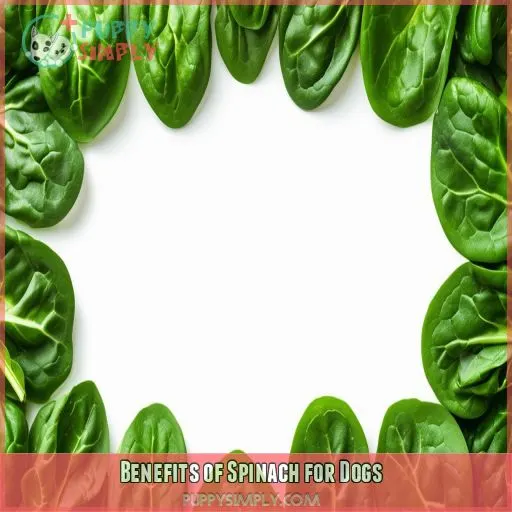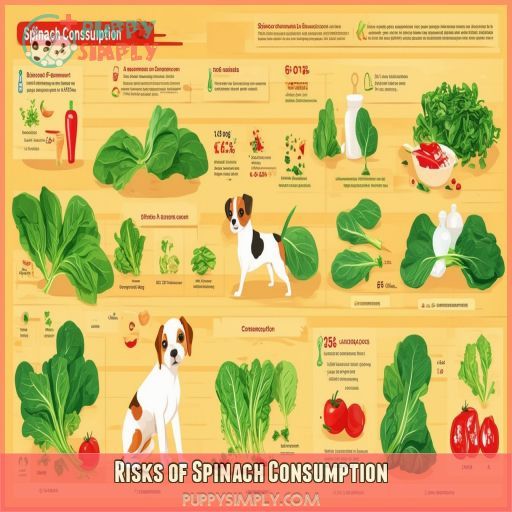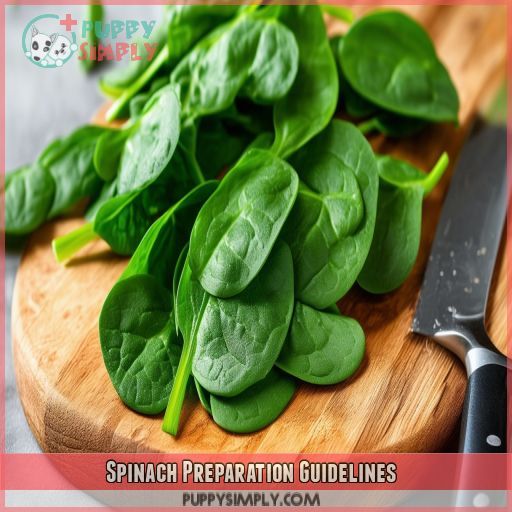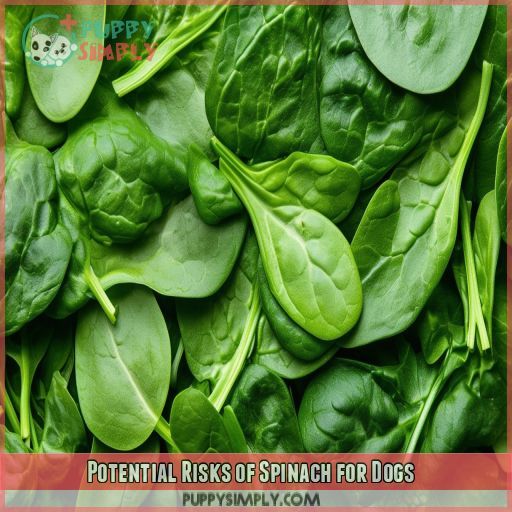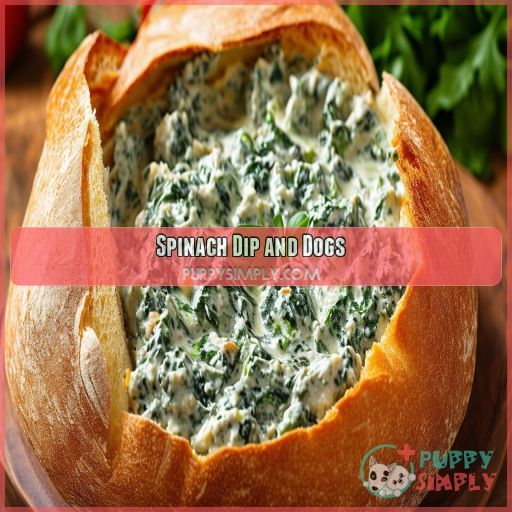This site is supported by our readers. We may earn a commission, at no cost to you, if you purchase through links.
 Want to treat your pooch to some spinach? You’re not alone. Dog owners everywhere are always asking, "Can dogs eat spinach?"
Want to treat your pooch to some spinach? You’re not alone. Dog owners everywhere are always asking, "Can dogs eat spinach?"
While this leafy green is full of nutrients and suitable for canines, you’ll want to know about the dangers and the proper ways to serve. Let’s talk about both the pros and cons so that you can add spinach into their diet safely.
Learn how to make the right decisions for your pooch’s nutrition and well-being from our detailed guide about spinach for dogs
Table Of Contents
- Key Takeaways
- Can Dogs Eat Spinach?
- Benefits of Spinach for Dogs
- Risks of Spinach Consumption
- Spinach Preparation Guidelines
- Considerations for Feeding Spinach to Dogs
- Potential Risks of Spinach for Dogs
- Spinach Dip and Dogs
- Frequently Asked Questions (FAQs)
- How much spinach can I give my dog?
- Can dogs eat spinach raw or cooked?
- What vegetables are not good for dogs?
- Is spinach a laxative for dogs?
- Can puppies eat spinach?
- How does spinach affect a dogs digestion?
- Is frozen spinach safe for dogs?
- Can spinach help with a dogs bad breath?
- Are there any spinach alternatives for dogs?
- Conclusion
Key Takeaways
- Spinach can be a nutritious treat for your furry friend, packed with vitamins and antioxidants. But don’t go overboard – moderation is key, or you might end up with a Popeye-powered pooch!
- While this leafy green offers some perks, it’s not all smooth sailing. The oxalic acid in spinach can be a party pooper, potentially causing kidney issues and calcium absorption problems. It’s like inviting a fun guest who also brings along their grumpy cousin.
- Preparation is everything! Steam that spinach to keep the good stuff in and the bad stuff out. Boiling it is a no-go – you’ll end up with sad, soggy leaves that have lost their nutritional mojo.
- Canned spinach and spinach dip are definite no-nos for your dog. They’re like the junk food of the spinach world – loaded with salt, fat, and potentially toxic ingredients. Stick to fresh, plain spinach to keep your pup’s tail wagging
Can Dogs Eat Spinach?
Yes, dogs can eat spinach, but moderation is key. This leafy green packs a nutritional punch with vitamins A, B, C, and K, iron, and antioxidants. It supports digestive health and offers fiber benefits.
However, spinach contains oxalic acid, which can interfere with calcium absorption and potentially contribute to kidney stones.
To serve safely, steam the spinach and chop it into small pieces. Avoid boiling, which can wash out nutrients, and skip any seasonings. Offer small amounts occasionally, not as a daily treat.
Always consult your vet before introducing new foods, especially if your dog has pre-existing health conditions.
There’s more to uncover about spinach’s effects on your furry friend
Benefits of Spinach for Dogs
Spinach is a nutrient-rich treat that offers vitamins A, B, C, and K, iron, and antioxidants, making it a powerhouse for your dog’s health. Additionally, its roughage content aids in digestion, promoting a healthy digestive tract
Nutrient-Rich Treat Option
Spinach is a nutrient-rich treat for dogs, providing numerous benefits:
- Rich in vitamins A, B, C, and K
- Packed with iron for healthy blood
- Antioxidant protection against cell damage
- Supports calcium absorption
- Roughage benefits for digestion
Digestive Health Benefits
Spinach can stimulate your dog’s digestive tract due to its high roughage content. This low-calorie option also includes beta-carotene and vitamin K, which support overall digestion.
| Digestive Benefits | Foods to Pair | Preparation Tips |
|---|---|---|
| High roughage | Bananas | Steam spinach |
| Beta-carotene | Blueberries | Chop finely |
| Vitamin K | Cantaloupe | Serve plain |
Antioxidant Powerhouse Foods
Spinach, loaded with antioxidants, offers numerous benefits for dogs’ immunity and overall health. Key nutrients include:
- Fiber: Aids digestion and keeps things moving smoothly.
- Beta-carotene: Supports eye health.
- Roughage: Enhances gut health, promoting efficient nutrient absorption
Risks of Spinach Consumption
Feeding your dog spinach has its risks. Spinach contains oxalic acid, which can block calcium absorption and potentially lead to kidney damage. This can cause kidney stress, muscle weakness, and abnormal heart rhythms over time. High oxalic acid content, plus long-term consumption, can contribute to kidney stones. Here are three key risks to be aware of:
- Kidney Issues: Dogs with pre-existing kidney problems should avoid spinach.
- Digestive Problems: Raw spinach can be hard for dogs to digest and might cause stomach upset.
- High Salt Content: Canned spinach often contains added salt, which is harmful to your dog’s heart health.
Consult your vet before introducing spinach into your dog’s diet
Spinach Preparation Guidelines
An important thing you should do in preparation for this is to ensure spinach arrives safely and confers benefits to your dog. Steaming spinach is the best way to retain its nutrients and avoid pitfalls associated with raw or boiled spinach. When you replace boiling with steaming, you avoid nutrient loss and ease digestion for your furry friend.
Preparation Tips:
- Steam the spinach to keep its helpful nutrient ingredients.
- Avoid boiling, which can wash out vital vitamins.
- Chop the spinach into small, digestible pieces.
- Feed it plain, without spices, herbs, salt, oil, onion, or garlic.
- Offer spinach in small amounts and infrequently to prevent health issues.
This careful preparation ensures your dog gets the benefits without the risks.
Considerations for Feeding Spinach to Dogs
Always consult a vet before giving spinach to your dog if your pet has any pre-existing health conditions. Following the recommended intake guides regarding spinach ensures they get all the benefits without the risks.
Consulting a Veterinarian
One should always consult a veterinarian before giving spinach to a dog. Veterinary advice guarantees safety from spinach, depending on the condition of the kidneys and, consequently the effects that may occur in the future. Harms and benefits should be discussed, especially if your dog has other health issues.
- Consider kidney health
- Alternates to spinach
- Professional advice on serving sizes and frequency
Recommended Spinach Intake
Moderate intake should be observed when giving spinach to your dog. Aim for:
- Extra-small dogs (2-20 pounds): 1/4 teaspoon
- Small dogs (21-30 pounds): half a teaspoon
- Medium dogs (31-50 pounds): 1 teaspoon
- Large dogs (51-90 pounds): 1/2 tablespoon
Monitor for side effects to help guarantee renal health and calcium absorption.
Potential Risks of Spinach for Dogs
While spinach does hold a little nutritional value for your dog, the risks to your pet far outweigh the benefits. Spinach contains compounds such as isothiocyanates and oxalic acid that trigger stomach upset, inhibit calcium absorption, and even aggravate existing heart conditions at high doses or when fed in canned forms.
Isothiocyanates
Isothiocyanates in spinach can cause:
- Stomach upset
- Digestive issues
- Mild toxicity
Like broccoli and kale, they may affect calcium absorption
Oxalic Acid
While spinach’s oxalic acid can block calcium absorption, it may also lead to kidney stones, muscle weakness, and abnormal heart rhythms
Canned Spinach
Canned spinach isn’t your dog’s best friend. Here’s why:
- High salt content
- Potential additives
- Nutrient loss during processing
Heart Disease
While canned spinach is high in salt, fresh spinach can also worsen heart disease in dogs. Here’s why:
- Oxalic acid interferes with calcium absorption
- Muscle weakness may develop, affecting heart function
- Abnormal heart rhythms can occur due to electrolyte imbalances
Digestive Issues
Spinach can upset your dog’s tummy. Watch for these signs:
- Vomiting
- Diarrhea
- Loss of appetite
- Abdominal discomfort
Oxalic acid may cause issues
Increased Blood Pressure
Spinach can raise your dog’s blood pressure, potentially leading to hypertension. This may increase risks of stroke, heart failure, and cardiac arrhythmias
Spinach Dip and Dogs
While spinach can be beneficial for dogs in moderation, spinach dip is a different story. You shouldn’t feed your dog spinach dip as it often contains dairy products that can upset their stomach, high fat content that may lead to pancreatitis, and potentially toxic ingredients like garlic and onion
Dairy Products
You might think spinach dip is a tasty treat, but it’s a no-go for your furry friend. Here’s why:
- Lactose intolerance
- Milk protein allergies
- Stomach upset
Dairy can wreak havoc on your dog’s digestive health
High Fat Content
While dairy can upset your dog’s stomach, the high fat content in spinach dip is equally concerning. It can lead to:
- Increased fat absorption
- Higher pancreatitis risk
- Potential weight gain
Consider healthier alternative treats instead
Toxic Ingredients
Spinach dip’s high fat isn’t the only concern. It often contains toxic ingredients that can harm your dog’s health. Here’s what to watch out for:
- Garlic
- Onion
- Chives
- Leeks
These ingredients impair digestion and absorption
Health Risks
Beyond toxic ingredients, spinach dip poses serious health risks for your furry friend. Long-term consumption can lead to:
- Kidney damage and stones
- Muscle weakness
- Abnormal heart rhythms
Protect your pup’s well-being!
Frequently Asked Questions (FAQs)
How much spinach can I give my dog?
You may well give your dog small spinach feeding, but it’s paramount that you exercise caution. A medium-sized dog weighing from 31 to 50 pounds is recommended one teaspoon, most. Consult your vet before you give any food item so as not to create discomfort in your pup’s tummy.
Can dogs eat spinach raw or cooked?
You’re right to take this safety measure! Dogs can eat spinach raw and cooked, but the best is steaming. It keeps the nutrients in while reducing oxalic acid. Remember that moderation is always the key; excess amounts may create health problems. Always consult your vet first.
What vegetables are not good for dogs?
You’ll want to avoid feeding your dog onions, garlic, wild mushrooms, and rhubarb. These vegetables can be toxic to dogs. Also, steer clear of avocados, raw potatoes, and tomato plants, as they’re potentially harmful
Is spinach a laxative for dogs?
Like Popeye’s secret weapon, spinach can pack a punch for your pup’s digestion. While it’s not a true laxative, spinach’s fiber content may promote regularity in dogs. You’ll want to introduce it gradually and monitor your pooch’s response
Can puppies eat spinach?
Do not give your puppy spinach since their system isn’t developed enough to digest it well. You better leave it until he’s older. Just puppies-specific food and treats recommended by your vets; those are good for perfect health and growth.
How does spinach affect a dogs digestion?
Spinach affects your dog’s digestion by stimulating the digestive tract. It’s rich in roughage, aiding bowel movements. However, its oxalic acid content can potentially irritate the stomach and interfere with nutrient absorption if consumed in large quantities
Is frozen spinach safe for dogs?
Like a frozen treat on a hot day, frozen spinach can be safe for dogs. You’ll want to thaw it first and avoid added salt or seasonings. It’s best served in moderation, following the same guidelines as fresh spinach
Can spinach help with a dogs bad breath?
Spinach won’t directly freshen your dog’s breath. While it’s nutritious, bad breath often stems from dental issues or digestive problems. Regular teeth cleaning and a balanced diet are more effective solutions for combating your pup’s stinky breath
Are there any spinach alternatives for dogs?
You’ve got options! Kale, chard, and collard greens are excellent spinach alternatives for your pup. They’re packed with similar nutrients but lower in oxalates. Remember to introduce new foods gradually and in moderation to avoid tummy troubles
Conclusion
When feeding your dog spinach, know what you’re giving. You’ve learned a great deal about the benefits and risks associated with this nutrient-rich green. Remember, everything is about balance.
Yes, dogs can eat spinach, but serve it right and consult a vet in advance. Be clear on potential issues like oxalic acid and isothiocyanates. As much as possible, avoid canned spinach and spinach dip.
If followed correctly, these recommendations can help you incorporate spinach safely into your pup’s diet and, in turn, potentially improve their health without any risk

